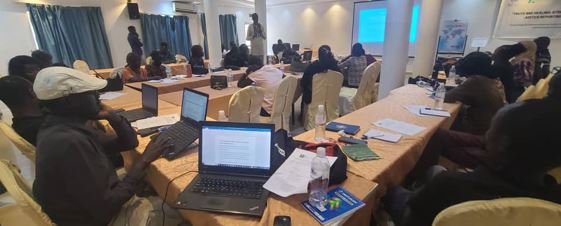At least 25 journalists on Friday received training in transitional justice reporting to promote sensitive storytelling that supports community healing.
The one-day workshop, organized by Advance South Sudan, aims to enhance the quality of transitional justice reporting in the country. This initiative seeks to empower journalists to adopt a victim-centered approach and foster greater public understanding of transitional justice processes.
Speaking during the opening session, Mawa Maya, the Executive Director of Advance South Sudan, said the main purpose of the training is to sensitize journalists on the recently passed Commission for Truth, Reconciliation, and Healing Act, 2024 (CTRH), and the Compensation and Reparation Authority Act, 2024 (CRA).
According to the 2018 revitalized peace agreement, the two bills are to facilitate the establishment of a commission that will spearhead efforts to address the relics of conflicts and promote peace, national reconciliation, and healing, and another commission for compensation and reparation respectively.
The two laws passed in September have provisions for the establishment of national museums for the prevention of conflicts and memorial centers in the ten states and three administrative areas. In addition, the bills also provide for the establishment of support centers for psychotherapy cases for both victims and perpetrators.
According to Maya, it is paramount for journalists to be enlightened on these areas.
“The training is mainly centered on transitional justice. As we all know, earlier this year we had two bills that were tabled in the parliament for discussion, mainly the Commission for Truth, Reconciliation, and Healing Bill 2024 (CTRH), Compensation and Reparation Authority Bill 2024 (CRA)” Maya said. “So, as we all know the two bills were passed into law and I think it is a high time that we bring in the media fraternity to be on the frontline, especially on reporting most of the key changes. So, I hope that we interact, learn from each other, and enlighten ourselves.”
He further noted that the training also aims at deepening the understanding of journalists on how to promote healing and ensure there is lasting peace among South Sudanese communities.
“I think most of us are probably familiar with transitional justice, but also, if you are not very familiar, we hope that through this training, we will be able to deepen our understanding of transitional justice so that we promote healing, equality, and peace” he stressed.
For his part, Daniel Majak, Secretary General of the Union of Journalists of South Sudan (UJOSS), said the training is important because it will educate journalists in transitional justice.




